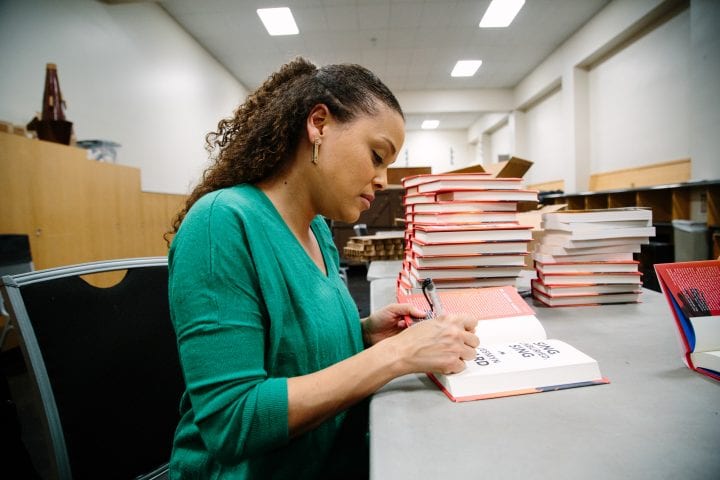
In Search of an American Childhood: On Jesmyn Ward
February 1, 2018
By Rachel Edelman
American legislators can’t seem to resist using impoverished children to slander and taunt the opposing political party. Forty-eight hours after Jesmyn Ward spoke for Seattle Arts & Lectures at Benaroya Hall, the U.S. Senate used a standoff over bare-bones protections for undocumented and uninsured kids—DACA and CHIP—to halt all “nonessential” work of the federal government. While that standoff lasted only the weekend, behind it lies a centuries-long history of injustice.
Here in the United States, childhood is parceled out to the privileged. In her lecture, Ward spoke of “marooned communities” who escaped enslavement only to live in underground caves, their children growing up stooped from the low roofs. This history is difficult to hear, tough to think about as politicians strip benefits from those who have little sense of safety. Ward described the grief that welled up when she found out she would be birthing a black boy in America: “My son had never taken a breath and I was already mourning him.” In live and haunted ways, Ward’s work resounds with the voices of black children who endure the weight of American oppression. Her new novel Sing, Unburied, Sing embodies the many weights that force children to assume postures of adulthood.
Sing, Unburied, Sing begins as Jojo, the protagonist, enters adolescence. In the book’s opening scene, Jojo shores up his courage to help his grandfather butcher a goat. The butchery doesn’t best the boy, but momentarily turns him, like the goat, inside out–he vomits outside the barn. His body is just beginning to orient toward sexual desire: his virginal eyes can’t help but linger on the bare shoulder of his mother’s friend.
While I was reading Sing Unburied Sing, I silently begged Jojo to come to his family’s rescue. While his mother Leonie drove the back roads between their Gulf Coast hometown of Bois Savage and Northwest Mississippi’s Parchman prison, I kept fantasizing about Jojo rising out of the back seat, waking his mother from her grief- and drug-driven complacency, and shielding his younger sister Kayla from the ravages of poverty and neglect.
As capable and self-assured as he is, Jojo is thirteen. His t-shirt hides “the unmarked swell of him: his smooth face, ripe with baby fat; his round, full stomach; his hands and feet soft as his younger sister’s.” I want Jojo to save himself and Kayla, but my desire, too, is part of the erasure of black childhood that lays an outsized burden on Jojo’s shoulders. An extension of this same erasure turns black boys into “superpredators,” creates prisons to replace plantations, and guns down young boys as they walk home from the store.
The history of such erasure is crucial to Jojo’s experience. At the prison where they pick up Jojo’s father, a ghost-boy enters their car and observes Jojo trying to be the protector I wish him to be. The boy likens Jojo to his grandfather, River, saying, “He protects as River protects. I want to tell him this: Boy, you can’t. But I don’t.” In Jojo’s life, River’s care is a reprieve, but not even the most capable adult presence can free him from the history that inhabits the soil, travels up through the fibers of trees and crops, and assimilates into the muscle of any animal that eats from the land.
Ward’s work will not tell us if River’s care is enough to shepherd Jojo into adulthood. I left the book and the lecture feeling uneasy with wonder: what else will this country’s willful blindness force him to endure?
Raised in a Jewish family in Memphis, TN, Rachel Edelman’s work explores how humans confront and evade the destruction we have wrought. She has received fellowships and residencies from the Mineral School, Crosstown Arts, the Academy of American Poets, and the University of Washington. She writes for the Ploughshares blog, and her poems have been published in The Threepenny Review, Foundry, Poetry Northwest, the Southern Humanities Review, and other journals. She writes, teaches, and resides in Seattle.